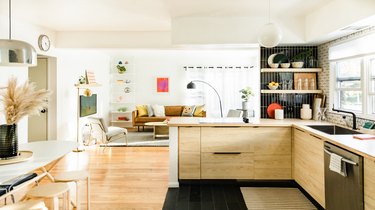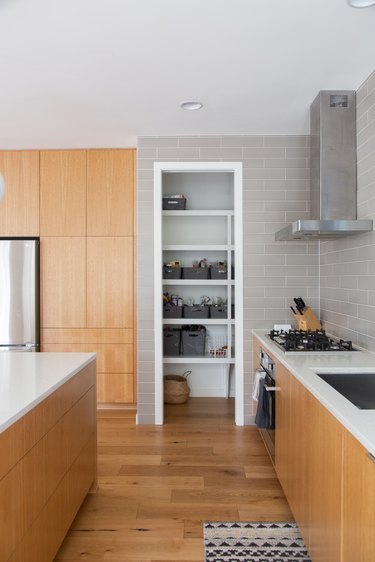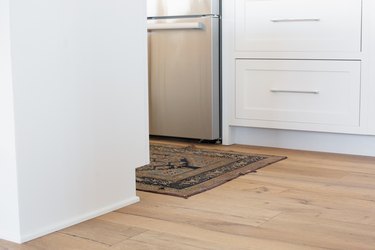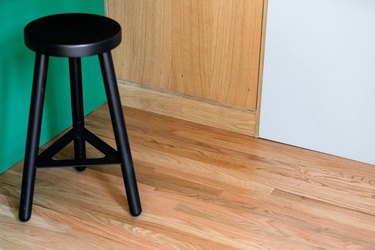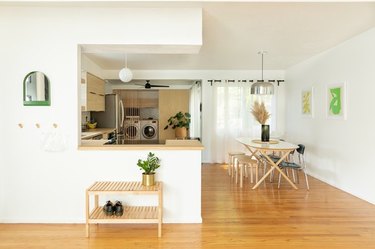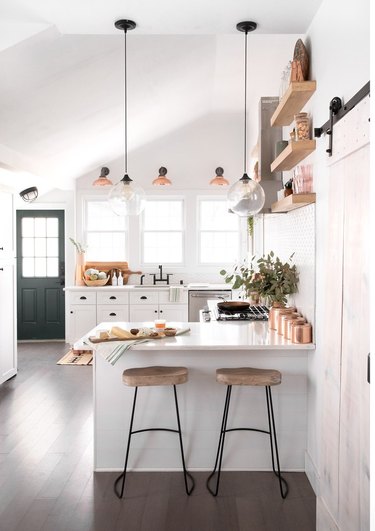In This Article
When it comes to kitchen renovations, we recommend that all homeowners weigh the pros and cons of bamboo flooring. It's similar to solid hardwood options, but depending on the type you choose and your installation method, this organic material can be much stronger and more water-resistant as well. What's more, if you look for bamboo flooring products from companies that have been certified by the Forestry Stewardship Council for their harvesting and manufacturing processes, they'll be eco-friendly and add a contemporary look to your cook space.
There are a number of different types of bamboo flooring options, and some work better in high-traffic areas than others. So before you select a product, it's important to check the manufacturer's warranty for durability and to make sure it's covered for kitchen installations.
Video of the Day
Video of the Day
Here is a breakdown of what you need to know before you take the plunge. From bamboo flooring pros and cons to styles and installation costs, we've got your kitchen floor decisions covered and then some.
A Bamboo Flooring Primer
There are solid bamboo planks and good quality engineered ones. Unlike typical wood, though, bamboo is a manufactured product. So while it is indeed bamboo through and through, it's created by a process that involves separating the stalks into thin strips or fibers and gluing them together under pressure. Engineered options consist of a top layer of processed bamboo covering a plywood core.
Horizontal/vertical bamboo: Because natural bamboo is tubular, the traditional processing method involves first slicing the stalks into strips, gluing them together to form logs, and turning those into planks. Milling along the grain produces a vertical pattern, while slicing across the grain produces a horizontal pattern. Bamboo planks produced this way are a little harder than red oak, which is considered to be one of the most durable floor materials.
Strand bamboo: About 10 years after the introduction of bamboo flooring in 1989, strand weaving was developed. This innovative process involves boiling the natural stalks to soften them and then separating those into individual fibers, which are then dipped in resin and pressed together. Strand weaving produces a super-hard "wood" with the highest hardness rating of any flooring material.
Is Bamboo Flooring Waterproof?
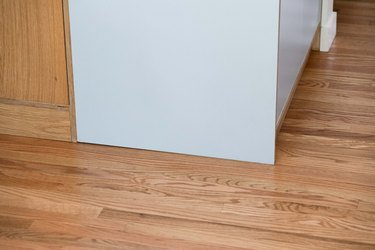
Like wood, bamboo absorbs moisture, and it can swell or sustain water damage, but some varieties perform better than others. According to Ambient Bamboo Floors, high-quality strand bamboo is waterproof for up to 20 hours, which means the flooring is safe from spills as long as you wipe them up within this time frame. Horizontal and vertical bamboo doesn't have quite the same moisture resistance, and less-expensive bamboo planks of this type often have a less-robust finish that more easily sustains water damage.
Warping is one of the potential problems with hardwood floors in general, and that also applies to bamboo. You wouldn't want to install this material in a kitchen with high humidity or in a basement. Engineered bamboo floor planks, by virtue of their construction, are more stable and may be suitable in such situations, but always check the manufacturer's recommendations.
The Pros and Cons of Bamboo Flooring
From costs to upkeep, there are many pros of bamboo flooring and a few cons to consider before making your final decision. Let's break it down.
Pros of Bamboo Flooring
- If purchased from a certified manufacturer, bamboo flooring is eco-friendly.
- It can be as durable as traditional hardwood.
- Bamboo flooring is easy to keep clean with mild soap.
- It has a sleek, modern look that makes any kitchen feel super stylish.
- Bamboo flooring installation is DIY-friendly.
- It can be refinished inexpensively.
- Bamboo floors add to the value of your house.
- They can be slightly more water-resistant than hardwood.
Cons of Bamboo Flooring
- Less expensive options can have toxins in the adhesive that's used to manufacture the flooring.
- Bamboo floors can scratch easily.
- Dramatic swings in humidity can cause warps and cracks in bamboo floors.
- Cheaper versions can become discolored.
- Less-expensive engineered bamboo flooring can not be refinished.
Bamboo Flooring Installation, Maintenance, and Repair
Solid bamboo flooring comes in tongue-and-groove planks that you nail down in the same way you would with hardwood. If you go with professional installation, you may be charged anywhere from $3 to $10 per square foot according to HomeAdvisor. And you must have a level, dry wood subfloor as the base. Engineered bamboo planks can also be nailed down, but they can also come with a click-together locking system that makes them DIY-friendly. These types of boards create a more versatile, floating layer that can go over an imperfect subfloor or even existing tile, hardwood, vinyl, or concrete. That means no sanding is necessary.
Maintaining a bamboo floor is fairly simple. You can keep it clean by sweeping and even vacuuming. On occasion, you can mop with mild soap and water. Because the floors can scratch or stain, you need to maintain the finish and consider a refinishing treatment every five to seven years.
Bamboo Flooring Vs. Quality Hardwood Flooring
Choosing between bamboo and hardwood flooring isn't easy; they have similar characteristics and costs. However, bamboo is typically lighter in color than most hardwoods, although there are darker versions that are "carbonized." Additionally, bamboo has a more uniform texture and grain than its counterpart. If certified, it can also be a more sustainable resource and a better choice for the environment. Both options require sealing against water, can be susceptible to scratching, and are regarded as premium flooring that will add value to your home.
What's It Going to Cost?
Bamboo flooring costs about $2 to $8 per square foot, and it's definitely worth your while to stick with products in the mid to upper price range for a kitchen — less-expensive products aren't as durable or water-resistant. A new bamboo floor in a 100-square-foot kitchen should cost a little more than $500 if you install it yourself and about twice that if you hire a professional.
